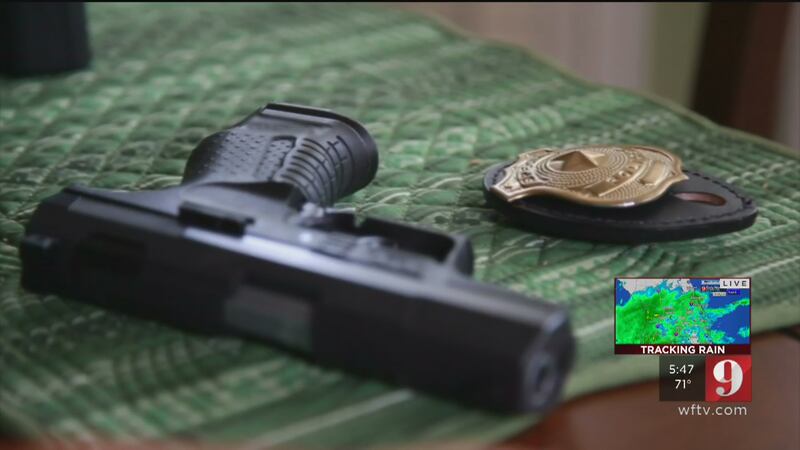ORLANDO, Fla. — To say Cedrick Bishop was troubled would be an understatement.
He had a long history of arrests in Brevard County. Some resulted in convictions. In 2003, he was found guilty of attempted robbery and two counts of burglary of a dwelling with an assault or battery. In 2007, he was found guilty of cocaine possession, resisting arrest, eluding law enforcement and trespassing. In 2013, he was found guilty of cocaine possession and resisting arrest. Over the years, he was convicted of other things, such as driving with a suspended license and no motor vehicle registration. On Jan. 21, 2015, he was found guilty of aggravated assault with intent to commit a felony. Less than 60 days later, he was dead. He was 30 years old. %
%
Bishop was shot to death by a Brevard County deputy. On March 9, 2015, Deputy Nick Worthy was one of several law enforcement officers who responded to a call near Moss Lane and Aurora Road in Cocoa. He was there to assist Cocoa police after they received reports of a man shooting a gun in the neighborhood, hitting cars and homes. One of the neighbors called 911 and told the operator a bullet had come into their home. There were children inside.
PHOTOS: Pictures from the crime scene after the shooting
When Worthy arrived, he said Bishop started to shoot at him. %
%
The following day Ivey updated the Brevard County community on the official Sheriff's Office Facebook page. In a nine-paragraph post, Ivey commended Worthy for his actions and condemned Bishop.
%
%
"I'm (am) absolutely disgusted that a violent career criminal with an arrest history like this is free to roam the community, terrorizing the citizens.," he wrote. "I could not be more proud of Deputy Worthy, he is a hero."
As we go to publish this story, the Facebook post is still live on the department's page.
No one else was injured in the shooting; Worthy's actions were deemed justified. The Brevard County Sheriff's Office moved on.
Bishop's death, however, was not reported to the Florida Department of Law Enforcement. WFTV discovered the discrepancy during our six-month review of the use of deadly force by law enforcement officers in Florida. It was one of about 70 police shootings in the state that were not reported to FDLE between 2007 and 2017.
"The data collection process is not totally uniform."
WFTV investigative reporter Daralene Jones also learned the FBI does not require local law enforcement agencies to report the deadly shootings to the federal government. The lack of mandatory reporting means the public received incomplete and unreliable information, not only about law enforcement officer-involved shootings, but other crimes as well.
Jones spoke with Prof. Jay Corzine. He teaches sociology at the University of Central Florida and helps Central Florida police track trends.
%
%
"The data collection process is not totally uniform," he said. "Most agencies report on a regular basis and most agencies are reasonably consistent with the guidelines they receive from the FBI."
The FDLE collects the data to keep tabs on state crime and as part of the voluntary FBI Uniform Crime Reporting program. About 390 of 400 Florida police agencies agreed to participate. The state provides these guidelines on what crimes to report, but an FDLE spokesperson told Jones each agency can still decide what to submit.
Photos: Look at the offense form law enforcement agencies fill out to send to the FBI
Despite the fact that all law enforcement agencies don't participate in the reporting system, Corzine insists it's the best one available in the United States.
"I don't see a strong mandate coming from the federal government because in fact it's not a huge incentive for them to do so," he told Jones. "It's much more complex, requires a lot more hours for police agencies to fill out the data, therefore a greater expense."
Jones rasked the FBI why the program isn't mandatory. As this story is published, WFTV has not received a clear response from the FBI, but Jones was told her request was expedited.
What is it like to shoot someone in the line of duty? Three law enforcement officers shared their stories with investigative reporter Daralene Jones.
- 'No good deed goes unpunished': Trooper recalls decision to shoot, kill 15-year-old-boy
- 'Faith is a big part': Deputy talks about life after fatal shooting, 9 years later
- 'We are basically a target': Lake County deputy opens up about killing two men
To get more insight into the reporting, Jones spoke with Charles Gruber, a former police chief who now works with the federal government to monitor police practices and reforms.
"As long as there's not a mandatory reporting, that's what it would take to get it to where it needs to be with uniform definitions that apply to everybody," Gruber said.
In January, the FBI launched the first national police use of force database. It's voluntary. On its website, the FBI says it is working to improve the way crime data is collected in the United States and the statistics of law enforcement's use of force. The definition of use of force, however, can vary from state to state or even from department to department.
Gruber predicts the database won't give the public an accurate account of incidents that also benefit the officers involved.
"Going to help police departments, we will learn who our outliers are, who are the people using force, why, can we change training, change tactics," he said.
As for the death of Cedrick Bishop, the Brevard County Sheriff's Office told WFTV in a previous report it does not report shootings that are considered justified.
To contact Daralene Jones about this report, click here.
Cox Media Group








